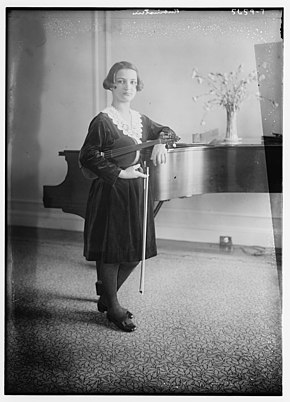Erna Rubinstein
Erna Rubinstein | |
|---|---|
 Erna Rubinstein, from the Bain News Service collection, Library of Congress | |
| Born | Ernesztina Rubinstein March 2, 1903 Sibiu, Hungary (today Romania) |
| Died | 1966 (aged 63) |
| Nationality | Hungarian, American |
| Other names | Erna Rubenstein, Edna Ford |
| Occupation | Violinist |
Erna Rubinstein (March 2, 1903–1966), born Ernesztina Rubinstein, was a Hungarian violinist.
Early life[edit]
Ernesztina Rubinstein was born in Sibiu in 1903. Her mother was a singer.[1] She studied violin with József Füredi in Debrecen, and with Jenő Hubay[2] at the Franz Liszt Academy of Music in Budapest,[3] from 1913 to 1918. As a young woman violinist, she was often grouped with (and compared to) her peers, Nedyalka Simeonova(1901–1959) of Bulgaria, and Erika Morini (1904–1995) of Austria.[4][5]
Career[edit]
Rubinstein toured as a young violinist in Europe and the United States.[6][7] She gave a recital at Carnegie Hall in 1922. "There is repose and poise in her performance," commented the New York Times reviewer Richard Aldrich, "but there is no lack of the brilliancy and spirit and rhythmic verve".[8] She played in the American midwest and plains states in 1923 and 1924,[9][10][11] and in California in 1925.[12] She accompanied Frieda Hempel in a 1928 concert,[13] and played in Minnesota and New York in 1929.[14][15]
Rubinstein appeared in two films, Stolen Wednesday (1933, also known as Tokajerglut), and Under a Gypsy Moon (1938, a musical short). She was heard on the Bing Crosby radio program in 1939, and was a guest performer with the El Paso Orchestra that year.[14]
Personal life[edit]
In 1944 Rubinstein married an American screenwriter, George Bruce.[16] Their short and tumultuous marriage[17][18] ended in divorce in 1946,[19] after widely publicized allegations of cruelty and violence, including an accusation that Bruce twisted Rubinstein's hand badly enough to affect her musical ability.[20][21][22] In the 1950s, she lived quietly with her mother in the San Lorenzo, California, and used the name Edna Ford.[23] She did some translation for Hungarian refugees in the East Bay area.[24] She died in 1966, in her sixties.
References[edit]
- ^ Rubinstein, Erna (July 1922). "A Fiddler Who Never Knew Stage-fright". The Musician. 27: 19.
- ^ "Music and Musical Literature". The Violinist. 32: 148. April 1923.
- ^ Margolis, Sasha (January 21, 2020). "Prodigious Talent: How Violinist Jenő Hubay Drew a Generation of Stars to His Budapest Studio". Strings Magazine.
- ^ Bozhikova, Milena (2015). "Simeonova, Nedyalka". Grove Music Online. doi:10.1093/gmo/9781561592630.article.2274336. Retrieved 2020-05-13.
- ^ Henderson, W. J. (December 27, 1922). "The Enjoyment of Music". The Outlook. 132: 758.
- ^ Gabriel, Gilbert W. (April 1922). "In the Concert Halls". The Musician. 27: 29.
- ^ "Sixteen-Year-Old Girl Violinist is Acclaimed Genius". Los Angeles Evening Express. 1922-02-21. p. 11. Retrieved 2020-05-13 – via Newspapers.com.
- ^ Aldrich, Richard (1922-03-26). "Music; Erna Rubinstein's Violin Recital". The New York Times. ISSN 0362-4331. Retrieved 2020-05-13.
- ^ Lenart, Eita (1923-04-29). "Music or Mischief, Erna Rubenstein Proves Prodigy in Both During Minneapolis Sojourn". Star Tribune. p. 58. Retrieved 2020-05-13 – via Newspapers.com.
- ^ "State Music Festival to be Held at Emporia April 24–27". High School Buzz. 1923-03-22. p. 4. Retrieved 2020-05-13.
- ^ "Erna Rubenstein is Wonder of Season". The Akron Beacon Journal. 1924-02-05. p. 6. Retrieved 2020-05-13 – via Newspapers.com.
- ^ Smith, Oenone (1925-01-23). "Girl Violinist Pleases in Concert". The Sacramento Bee. p. 19. Retrieved 2020-05-13 – via Newspapers.com.
- ^ Tunbridge, Laura (2018-07-11). Singing in the Age of Anxiety: Lieder Performances in New York and London between the World Wars. University of Chicago Press. p. 104. ISBN 978-0-226-56360-2.
- ^ a b "El Paso Orchestra's Guest Violinist Finds Most Fun in her Movie Acting, She Confides". El Paso Times. 1939-11-19. p. 1. Retrieved 2020-05-13 – via Newspapers.com.
- ^ "Erna Rubinstein, Violinist, Plays". The New York Times. 1929-01-26. ISSN 0362-4331. Retrieved 2020-05-13.
- ^ "Miss Rubenstein Weds". The Knoxville News-Sentinel. 1944-06-12. p. 6. Retrieved 2020-05-13 – via Newspapers.com.
- ^ Parsons, Louella O. (1945-02-02). "Hollywood Pair Ban Divorce". The San Francisco Examiner. p. 3. Retrieved 2020-05-13 – via Newspapers.com.
- ^ "Erna Rubinstein Battle on Again". The Los Angeles Times. 1946-03-02. p. 5. Retrieved 2020-05-13 – via Newspapers.com.
- ^ "Erna Rubenstein Accused of Marrying for Money". The Miami News. 1946-03-16. p. 1. Retrieved 2020-05-13 – via Newspapers.com.
- ^ "Erna Rubinstein Tells Assault Story in Court". The Los Angeles Times. 1945-08-24. p. 15. Retrieved 2020-05-13 – via Newspapers.com.
- ^ "Erna Rubenstein Granted Alimony". The San Francisco Examiner. 1945-08-12. p. 2. Retrieved 2020-05-13 – via Newspapers.com.
- ^ "Bruce Files Cross-Bill Against Erna Rubenstein". The Baltimore Sun. 1945-08-14. p. 5. Retrieved 2020-05-13 – via Newspapers.com.
- ^ Gessler, Clifford (1956-09-02). "Erna Rubinstein, Violinist, in Eastbay". Oakland Tribune. p. 61. Retrieved 2020-05-13 – via Newspapers.com.
- ^ "Dictionary Best Gift". Daily Review. December 25, 1956. p. 1 – via NewspaperArchive.com.
External links[edit]
 Media related to Erna Rubinstein at Wikimedia Commons
Media related to Erna Rubinstein at Wikimedia Commons- Audio on YouTube, Erna Rubinstein plays "Sérénade Espagnole" by Cécile Chaminade / Fritz Kreisler
- Erna Rubinstein at IMDb
